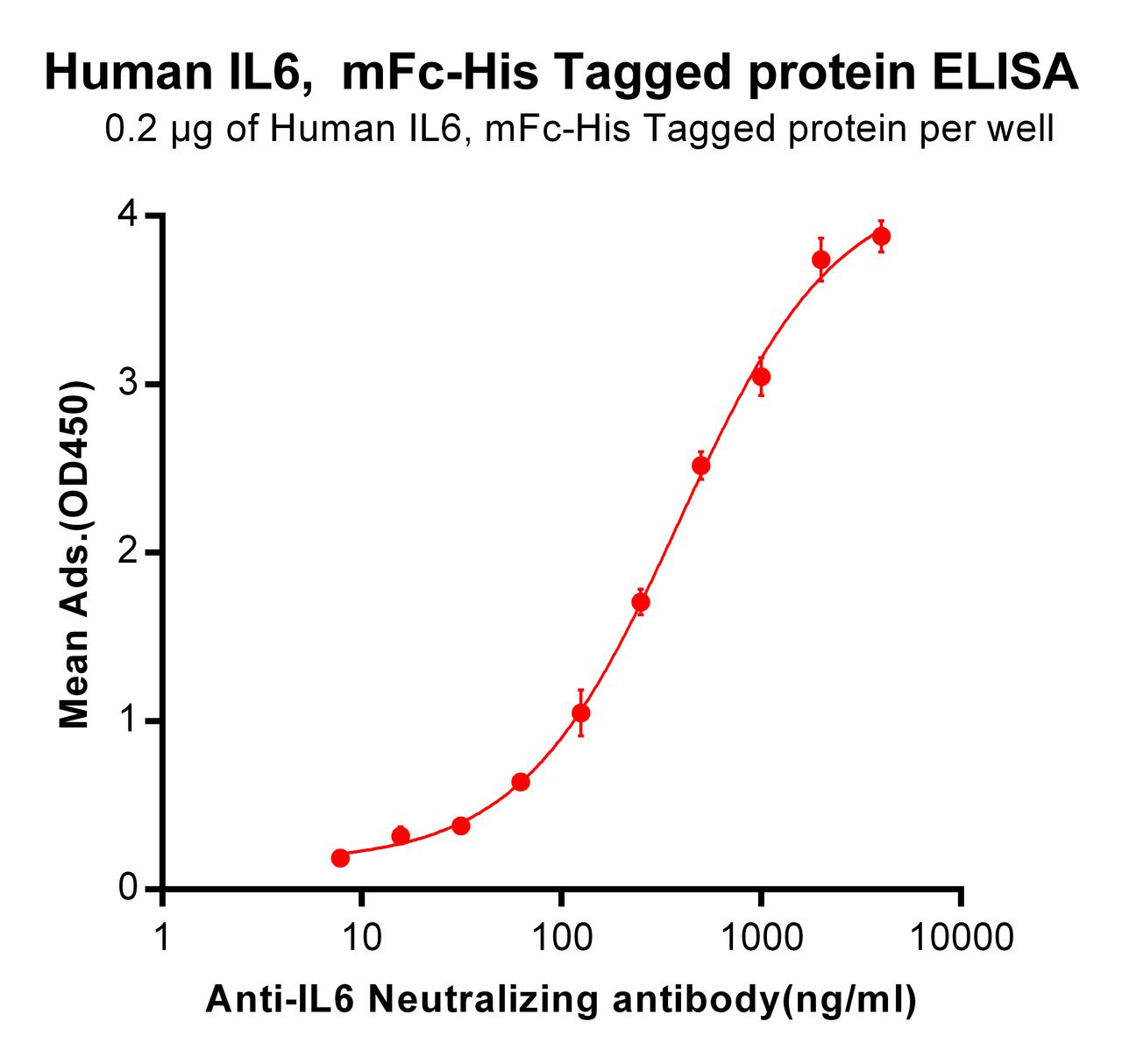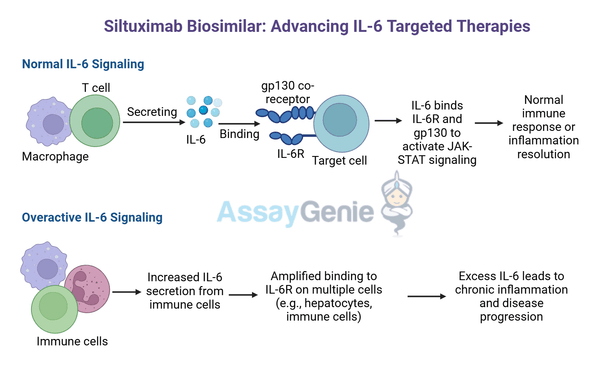Siltuximab: Exploring IL-6 Inhibition in Castleman’s Disease and Research
Quick Facts About Siltuximab
What is Siltuximab?
What is the mechanism of action for Siltuximab?
Siltuximab binds to IL-6, preventing it from interacting with its receptor and mitigating downstream pro-inflammatory signaling.
What are the clinical applications of Siltuximab?
1.) Understanding Siltuximab
What Makes Siltuximab Unique?
Siltuximab is a chimeric monoclonal antibody specifically designed to neutralize interleukin-6 (IL-6), a pro-inflammatory cytokine that plays a central role in immune regulation and inflammation. IL-6 is a critical mediator in numerous pathological processes, including chronic inflammation, autoimmunity, and oncogenesis. Overproduction of IL-6 is a hallmark of various diseases, contributing to abnormal immune activation, increased production of acute-phase proteins, and disruption of normal cellular signaling pathways.
What makes Siltuximab unique is its high affinity and specificity for IL-6, allowing it to effectively inhibit IL-6-mediated signaling. By binding to IL-6, Siltuximab prevents its interaction with the IL-6 receptor (IL-6R), thereby halting downstream activation of the Janus kinase (JAK)/signal transducer and activator of transcription (STAT) pathway. This mechanism reduces the production of inflammatory mediators, mitigates immune dysregulation, and normalizes cellular responses, offering a targeted therapeutic approach.
Siltuximab’s clinical relevance is particularly notable in idiopathic multicentric Castleman’s disease (iMCD), a rare lymphoproliferative disorder characterized by excessive IL-6 production. Patients with iMCD often experience systemic symptoms such as fever, weight loss, and anemia, driven by IL-6-induced inflammation. Siltuximab is the first FDA-approved treatment for iMCD and has shown significant efficacy in alleviating symptoms, reducing disease markers, and improving overall quality of life.
Beyond iMCD, Siltuximab is being investigated for its potential in managing other IL-6-driven conditions, including certain cancers such as multiple myeloma and inflammatory disorders like rheumatoid arthritis. Its targeted action and proven benefits make Siltuximab a valuable therapeutic agent in addressing diseases linked to IL-6 dysregulation.
Prefer to Listen? Check out the Siltuximab Podcast Episode
2.) Mechanism of Action of Siltuximab
Siltuximab is a chimeric monoclonal antibody designed to neutralize interleukin-6 (IL-6), a cytokine central to inflammation and immune system regulation. In conditions characterized by excessive IL-6 production, such as idiopathic multicentric Castleman’s disease (iMCD), IL-6 drives pathological immune activation, triggering a cytokine storm that results in systemic inflammation and severe clinical symptoms.
By binding directly to IL-6, Siltuximab prevents the cytokine from interacting with its receptor, IL-6R. This blockade interrupts downstream signaling through the Janus kinase (JAK) and signal transducer and activator of transcription (STAT) pathways, which are critical for the production of acute-phase reactants like C-reactive protein (CRP) and serum amyloid A (SAA). Additionally, the inhibition of IL-6 activity suppresses the release of other pro-inflammatory cytokines and chemokines, thereby reducing inflammation and immune overactivation.
Siltuximab’s effectiveness in iMCD highlights its ability to target the underlying drivers of disease. In this condition, IL-6 overproduction leads to debilitating symptoms such as fever, fatigue, weight loss, and anemia. By neutralizing IL-6, Siltuximab alleviates these symptoms, slows disease progression, and improves patients’ quality of life.
Beyond iMCD, Siltuximab’s mechanism of action has potential applications in other IL-6-driven conditions, such as autoimmune diseases, chronic inflammation, and cancers like multiple myeloma. Its precise targeting of IL-6, without broadly suppressing the immune system, underscores its role as a valuable therapeutic tool in modulating immune responses.

3.) Clinical Applications of Siltuximab
Siltuximab, a monoclonal antibody targeting interleukin-6 (IL-6), is under investigation for various clinical applications in oncology due to IL-6's significant role in cancer progression and immune evasion. Its ability to neutralize IL-6 has made it a promising therapeutic agent for conditions driven by this cytokine.
In multiple myeloma, IL-6 acts as a key growth factor for malignant plasma cells, promoting survival and resistance to chemotherapy. Siltuximab disrupts these processes, enhancing the effectiveness of standard treatments such as proteasome inhibitors and immunomodulatory agents. Clinical trials are ongoing to assess its potential in combination therapies for improved outcomes.
In solid tumors, including ovarian, pancreatic, and renal cell carcinoma, IL-6 plays a crucial role in fostering metastasis, angiogenesis, and immune suppression. By inhibiting IL-6, Siltuximab may help reduce tumor progression and enhance the immune system's ability to combat malignancies.
Another important area of clinical application is the management of cancer cachexia, a condition characterized by severe weight loss and muscle wasting driven by IL-6-mediated inflammation. Siltuximab’s ability to mitigate these effects could significantly improve the quality of life for oncology patients.
While it is not yet approved for these indications, ongoing research and clinical trials continue to explore Siltuximab’s utility in oncology. The growing understanding of IL-6’s role in cancer underscores the potential for Siltuximab to be integrated into future cancer care protocols, provided robust clinical evidence supports its safety and efficacy.
4.) Advancing Research with Siltuximab Biosimilar
How Biosimilars Transform Research
Our Siltuximab biosimilar is a powerful tool for research applications, providing cost-effective and reliable alternatives to original biologics.

| Siltuximab (Anti-IL6) Biosimilar Antibody | |
|---|---|
| Antibody Type: | Monoclonal Antibody |
| Protein: | IL-6 |
| Reactivity: | Human |
Benefits of Siltuximab Biosimilar
- Innovative Research: Supports exploration into IL-6-related pathways.
- Cost-Effective: Offers an accessible option for non-clinical research purposes.
- High-Quality Standards: Ensures reproducibility and reliability in experimental settings.
Disclaimer: The Siltuximab biosimilar is for research use only and not for clinical or therapeutic applications.
Discover Our Biosimilar Range
At Assay Genie, we specialize in providing high-quality biosimilars for research use! Check out our full biosimilar range to learn more.

By Marina Alberto, PhD
Marina Alberto, PhD, holds a robust academic background in Biotechnology, earning her Bachelor’s Degree and PhD in Science and Technology from Quilmes National University. Her research spans cancer immunotherapy, glycan profiling, and vaccine development, including innovative projects on pediatric leukemia diagnosis and cancer-associated carbohydrate-mimetic vaccines. She currently serves as a Technical Support and Sales Specialist at Assay Genie.
Recent Posts
-
Enavatuzumab: Revolutionizing Cancer Research Through Novel Therapeutics
Quick Facts About EnavatuzumabWhat is Enavatuzumab?Enavatuzumab is a monoclonal antibo …17th Dec 2025 -
Alemtuzumab: Mechanism, Applications, and Biosimilar Advancements
Quick Facts About AlemtuzumabWhat is Alemtuzumab?Alemtuzumab is a monoclonal antibody …17th Dec 2025 -
Validation of MycoGenie Rapid Mycoplasma Detection Kit - A highly sensitive visual determination method for Mycoplasma detection.
The MycoGenie Rapid Mycoplasma Detection Kit enables the detection of 28 Mycoplasma sp …3rd Mar 2025




